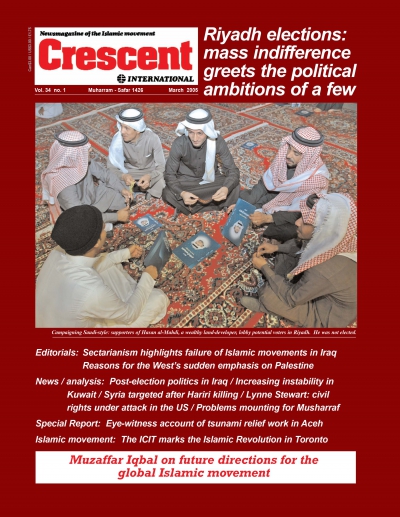Crescent International Vol. 34, No. 1
Newsmagazine of the Islamic movement
Iqbal Siddiqui
Muharram, 1426 2005-03


The politically organized people of Iran erupted against centuries of misrepresentation and misrule twenty-six years ago. Under the fearless and forward-moving leadership of Imam Khomeini (ra) and the politically conscious ulama with him, Iran was declared an Islamic Republic. It also proclaimed itself to the bi-polar Cold War world as belonging to neither America nor the US; the proud boast of the time was: “NeitherEast nor West; Islam is the best.” It also presented itself as a fresh alternative to the Sunni-Shi’a dichotomy, determined not to be distracted or consumed by sectarianism: “Neither Shi’i, nor Sunni; rather an Islamic Revolution.”

Considering the great emphasis that the United States and the administration of president George W. Bush are placing on promoting political reform and democracy in the Middle East, as their panacea for the anti-American feeling throughout the Muslim world, one might have expected more fuss about the holding of historic elections in the Saudi kingdom, the tribal state currently administering the Hijaz, site of the holiest places in Islam. The country’s first elections for more than 40 years, the first stage of a three-phase election process for members of municipal councils, took place in the Riyadh region on February 10.

Every year, Muslims around the world mark the first days of the new year of the Islamic calendar by remembering and commemorating the events that led to the martyrdom of Imam Hussain (ra), the beloved grandson of the Prophet of Islam (saw) at Karbala in the 61st year after the Hijra (680CE). The tragedy is, of course, and understandably, marked most prominently by Shi’i Muslims, but it should be noted that there has traditionally been no difference between the Shi’as and the Sunnis in their understanding of the rights and wrongs of the political issues that resulted in the tragedy -- indeed, crime.

The ICIT conference in Toronto marking the 26th anniversary of the Islamic Revolution was attended by several senior Islamic movement leaders. This is the paper presented by HUJJATUL-ISLAM MOHAMMAD BAQER ANSARI of the Department of International Affairs of the Rahbari (the office of the Leader of the Islamic Revolution).

On February 12 the Institute of Contemporary Islamic Thought (ICIT) and the Islamic Society of York Region convened a conference in Toronto to mark the 26th anniversary of the Islamic Revolution in Iran. Here we publish a report on the conference.

In many ways, the results of the recent elections in Iraq have come as no surprise. The United Iraqi Coalition (UIC), the Shi’a Muslim slate sponsored by Grand Ayatullah Ali al-Hussayni al-Sistani, got 48 percent of the 275 seats in the new national assembly; a Kurdish alliance 25 percent; and US-backed interim prime minister Iyad Allawi’s list 14 percent.

The assassination of former Lebanese prime minister Rafik al-Hariri in an enormous explosion in Beirut on February 14 sent as many political ripples through the region as questions it raised about the motives and identity of those who carried out the attack.

Kuwait’s role as a launch-pad and base for US-led troops operating in Iraq is coming to haunt the Gulf emirate. A string of gun-battles between government troops and militants planning to target American troops in the country, as well as oil facilities, has pushed Kuwait closer to the brink.

Writers are prisoners of the language they use, particulary if they wish to express ideas that run contrary to the way in which words are commonly used. There are idioms, expressions and even names that convey certain meanings and impressions, when the reality to which they are applied is very different.

Two months after the Indian Ocean tsunami, people in Aceh and many other areas are living in appalling conditions. DR AUSAF AHSAN, a Crescent reader from Bangalore, India, travelled to Aceh to assist the relief effort there.

The conviction on February 10 of Lynne Stewart, a leading civil-rights lawyer, on five counts of conspiring to aid “terrorists” and lying to the government has shocked the American legal profession. Others, too, have expressed concern about civil liberties and see fascism on the march in the US under George W. Bush and his army of “neo-cons”.

Aslan Maskhadov, the exiled leader of the Chechen independence movement, last month urged the Kremlin to begin talks to end a decade of conflict. The call for peace talks came as local officials admitted that the ceasefire Maskhadov had ordered earlier had been effective.

Despite his rhetorical claim that he is “not scared of anyone”, general Pervez Musharraf is a worried man. The “not scared” boast flies in the face of the facts: he is in effect a prisoner in the presidential compound. Meetings and conferences are organized inside the compound so that he does not have to go out, for fear of being assassinated.

The Kyoto protocol on climate change came into effect on February 16, when it was ratified by more than 140 countries, including the 34 most industrialised nations. But the US, the world’s worst polluter, has refused to sign it, and developing countries, including China, the next biggest polluter, and India and Brazil, both significant contributors to today’s worst environmental problem, are exempt.
